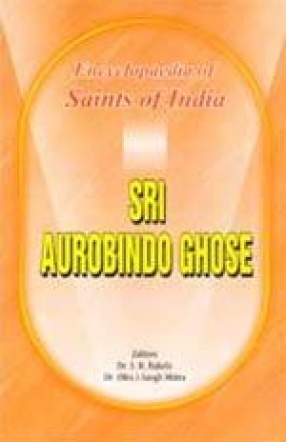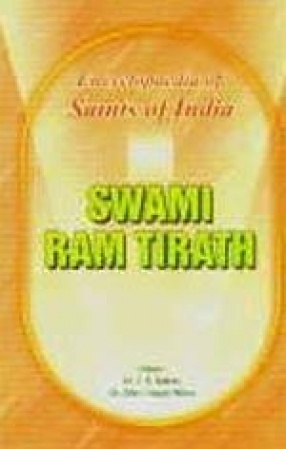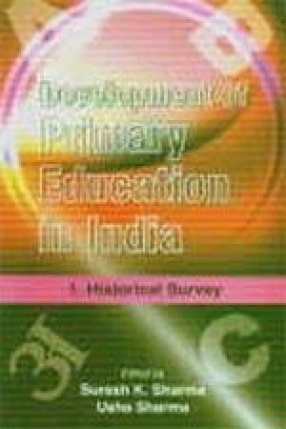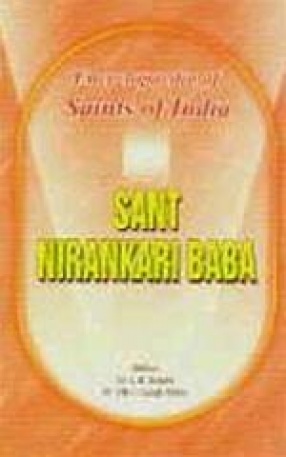
Criterion Publications

26 books























Vinoba Bhave’s contribution in political and socio-economic struggle for the attainment of swaraj was a significant phenomenon in the annals of our sub-continent. A true Gandhian as he was he appeared to be a saint from his dress which indeed was very simple. His sincere identification with the causes of the rural people made him quite popular. His Bhoodan and Gramdan movements brought about significant and historic results. The book has deep bearing on swaraj, ...

The theme of this work has deep bearing on the political and philosophical ideology of a learned saint, Sri Aurobindo, who in his early years, was deeply interested in raising the banner of revolt against the colonial rule. Having deep connections with the revolutionary movement, he performed his innings in an appreciable way. But ultimately, he landed into Pondicherry where he founded the Ashram which gained international fame. This work deals with his life as a ...

The theme deals with the religious philosophy of Gautama Buddha who renounced the royal robes and power, became a monk and ultimately founded Buddhism which spread in several regions of India and the neighbouring countries. Buddha travelled widely and his philosophy greatly attracted people who became his ardent disciples. As a result several viharas were inaugurated where the main emphasis was on the life of piety and social service. The chapters thus deal with ...

Ramanuja’s role as a great religious teacher is unique in the annals of our sub-continent. His matha established at Srirangapatnam, was financed by several kings and affluent people. Soon he could attract thousands of his followers in the south as well as in the north of India. His ideology and philosophy were a challenge to the teachings of Adi Sankaracharya. The theme has been divided into nine chapters along with comprehensive appendices. They depict his ...

Saint Kabir is counted among the few well-known poets of his age. His poetry is simple, lucid in style and devoid of any kind of complexity. It is indeed for the common man and his welfare. His verses are studied with much interest by teachers and students. His writings are prescribed even at the university stage. The text contains nine chapters which include his simple way of living, the social condition of his age, his religious views which he lucidly depicted ...

Swami Dayananda played a most significant role in the foundation of the Arya Samaj during the nineteenth century. The theme contains seventeen chapters having deep linkage with the socio-religious philosophy of Swamiji who was eminently dedicated to the vedic culture. His teachings indeed greatly influenced the people, mostly of the Northern region and Lahore became the biggest centre of Arya Samaj. The chapters deal with his concept of nationalism, the ...

The theme weaved into seven chapters deal with the philosophic approach to life by Kalidasa, a renowned author and poet. In fact he devoted his whole life for scholarly pursuits which had deep bearing on societal problems. He also suggested their solutions. The concept of love and beauty in his plays and poetry are marvellous in contents. Indeed he is very clear about the ideology he preached through his writings. The compilation of several facts on Kalidasa ...

Swami Ram Tirath renounced his domestic life to seek truth. His concept of Vedanta is fairly comprehensive and all pervading. He was very much fascinated by the syllable Om. According to him Om has a charm and majesty of its own. In Rama’s concept of nationalism, there is love and love alone. He also discussed the poverty of the Indian masses. He opined that poverty is the mother of all social, political and moral ills. The theme has eleven chapters and ...

The theme in this work clearly lays emphasis on the socio-religious philosophy of Lord Mahavira, the founder of Jainism. The nineteen chapters dealing with his writings, preaching and principles are significant as they lay emphasis on fundamental principles of Jainism, teachings of Lord Mahavira, the great scriptures of Jains, right attitudes in life, views for a disciple, ways and means of inner development, purity of thought and life, five types of knowledge, ...

Swami Vivekananda is considered one of the prominent saints of our sub-continent. He preached social service, disciplined life and dedication to humanity which had deep bearing on all aspects of national renaissance. His oratory and arguments regarding God and religion greatly impressed the people of USA and England. A towering intellectual as he was, his disciple Ramakrishna Parmahamsa brought forward his ideology during his time. Indeed these chapters deal ...

The name of Mirabai is well-known in the annals of our history. Married in an orthodox family, she became a widow at a young age. From her younger days, her devotion to Lord Krishna was proverbial. His devotional poems and her message of Bhakti deserve much appreciation from her devotees. Brindaban-Leela is respectfully attached to her name. The theme contains ten chapters which deal with her religious and devoted career. These are her early career, the divine ...

The theme of this work has deep bearing on the religious philosophy of Saint Tulsidas whose emergence on the social scene of our sub-continent brought about a change which benefited Hinduism and other religions. The authorship of the Ramayana is his greatest academic contribution which has made several generations to show spontaneous love and respect for him. Besides he showed us the principle of moksha, three paths of salvation, descent of God and several other ...

Radha Soami Mat is a school for spiritual enlightenment and realization of reality. Like Guru Nanak Dev, Kabir, Tulsi Sahib and other saints, Soamiji is also a true and perfect saint. Soamiji lays much emphasis on satsang, satguru and Name, Nam or Shabad. Guru is God Himself in the human form and we should search for a true and perfect Guru. We should sacrifice our body and develop extreme love and devotion for our Guru. Then the form of our Guru will stay in our ...

The early career of Valmik depicts him as an ordinary person performing an unsocial job which involved him in highway robbery. The illustrious sapta rishi brought about an unexpected change in his career and after years of tapsya, he became Valmik Rishi. He authored the Ramayana and thus gained the most illustrious fame in the annals of our history, nay, the Hindu society. The theme contains seven chapters which depict, in a comprehensive way, the poet’s deep ...

Ramakrishna Parmahamsa's career was unique in the socio-religious history of our sub-continent. His life passed through several experiments having deep bearing on his search for truth and knowledge. At last he succeeded in his mission which showed its worth at national and international level. Devotees—men as well as women—thronged to listen to him with highest degree of discipline. The theme contains fifteen chapters and two appendices which deal with the ...

Hazrat Nizam-ud-din Auliya and Hazrat Khwaja Muinuddin Chishti represented a unique generation of saints who are ever loved and respected by millions of their devotees in India and abroad. They were scholars, opposed slavery, showed much love and respect for women and children, propagated quest for reality and truth, realism as a school of thought, concern for ailing people and a truthful model of conduct. The text contains two parts. Whereas the former deals ...

Chaitanya’s appearance greatly enlightened all classes of people who were totally disillusioned at that time. The cult of Bhakti as depicted by Chaitanya became the perfect answer to the question of revival of Hinduism. He used to draw large crowds by his pleasing personality and everybody became moved and pleased by his divine grace—and attractive feature of Bhakti—dharma. The theme has been divided into ten chapters which have deep bearing on his early ...

Guru Gobind Singh was the last Guru of the Sikhs who always preached piety, simple life, dedication to noble causes, truth and fearlessness. The great sacrifice of Guru Teg Bahadur generated the spirit of sacrifice in his mind and heart. He led a disciplined life and opposed violence and injustice along with the cooperation and support of his dedicated workers. The founder of the ‘Khalsa’ brought about the sense of confidence and bravery among the Sikhs. The ...

Dadu Dayal belonged to Rajasthan and gathered around himself a group of followers who were known as Dadu-panthi. He stated quite clearly, 'When realisation came to me, I was filled with joy and all fear departed from me. I found pure deliverance in the realm of the unapproachable.’ In fact he loved the merciful God. He has found that God is unchangeable, immortal, fearless, self-existent, almighty, pure, unseen, infinite and uncomprehensible. Therefore worship ...

Guru Nanak Dev's early career shows that he was born to do a 'great' work for the welfare of humanity. His was a dedicated and disciplined life who believed and preached piety, truthfulness, non-violence, non-possession and mutual support, his hymns and teachings throw much light on the working of his pure mind which always gives us a valuable lesson to do much work for the welfare of the people irrespective of the fact that they belong to a particular caste, ...

Sant Tukaram was a well-disciplined and a sincere devotee of God. He opined, ‘God cares for love, not for food’. He was non-possessive and used to distribute his small possessions among the needy. He emphasised the life divine and explained his desire for the Amrita. He stated that the attainment of the Amrita is through the Nama and man’s liberation is through the Amrita. The text contains fourteen chapters having deep bearing on ideology and philosophy of ...

Education for children must be the first call on the nation’s resources. Children however take time to grow up and in the meantime events will not wait. The concept Universalisation signifies that education is for all and not for a selected few. This also means that education is the birthright of every child. Primary education is shaped according to the prevailing social and philosophical milieu and is regarded as the foundation for the entire superstructure of ...

Sri Sankaracharya was one of the brightest minds in the firmament of medieval Hindu philosophy and a mighty force in the restitution of numerous thoughts and beliefs. In fact, he was deeply attracted towards asceticism at an early age. He was a erudite scholar, a very fine orator and could discuss any thing with deep knowledge and confidence. He wrote on the principles of Upanishads, Bhagavad Gita and the Brahma Sutra. He opined that there is but one God and he ...

The theme has deep bearing on the social philosophy of Sant Nirankari Baba who in the last five decades has created a disciplined army of his followers not only in our sub-continent, but also in several foreign countries. His annual congregations are held with much success and thousands of his dedicated followers come to attend it with love and respect for the Babaji. Social service to humanity, truthfulness and disciplined life are the main principles of this ...
